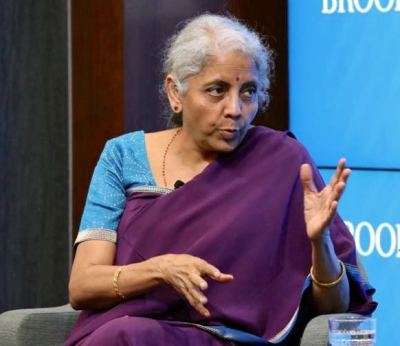New Delhi: The GDP slowdown in September quarter was not “systemic” and the economic activity in third quarter, with better public expenditure, is likely to compensate for the moderation, Finance Minister Nirmala Sitharaman said Friday.
India recorded a 7-quarter low GDP growth of 5.4 per cent in July-September FY25. In the first quarter, the growth was 6.7 per cent.
“It is not a systemic slowdown. It is more of absence of activity on public expenditure, capital expenditure and so on…I expect Q3 to make up for all these,” Sitharaman said at an event here.
So, growth number is something which is not necessarily going to get badly affected, she added.
“We need to push up on many other factors,” she said adding India would continue to be the fastest-growing economy next year and thereafter.
Growth momentum was low in the first quarter due to general election and reduction in capital expenditure. This has had a bearing on the second quarter as well.
In the first half, the government spent only 37.3 per cent of its capital expenditure target of Rs 11.11 lakh crore for FY25.
The minister’s comments came moments after the Reserve Bank of India sharply slashed its growth projection to 6.6 per cent for the current fiscal from 7.2 per cent earlier.
Other factors affecting growth include plateauing global demand that affected export growth, Sitharaman said.
“Purchasing power of Indians is improving, but within India, you also have concerns of wages saturating. We are quite seized of these factors which might have a play on India’s own consumption,” she said.
The finance ministry, in its Economic Survey for FY24, had estimated a GDP growth of 6.5-7 per cent for the current fiscal year.
“We have a Prime Minister who looks at opportunities in each of the challenges. During Covid-19, the challenge was seen as an opportunity for bringing in reforms. Five mini budgets were presented at that time, each of them giving relief, support and handholding on one hand and on the other making sure that small and overlooked pending reforms were taken,” she said.
Being the voice of the Global South for some time now, India will carry forward its role that everyone saw during India’s G20 Presidency, she added.
Every time Prime Minister Narendra Modi takes up an issue of global importance, he does consult the Global South and takes their concerns forward.
Referring to the India-Japan relations, she said the two countries shared strong business ties.
“Between India and Japan, other than just the governments, what needs to be sustained is the people-to-people and business-to-business interest. Despite some ups and downs, relationship between countries remains strong and at a stable level when people-to-people and business-to-business contacts are safe, strong and deepened,” she said.
PTI






































